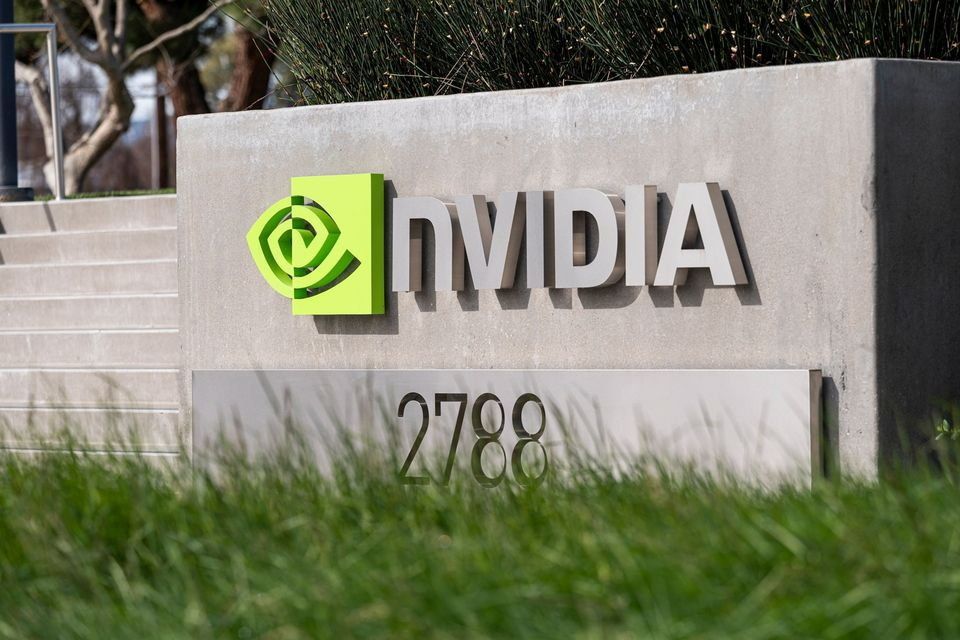The future of Big Tech: Who’ll still be ‘in’ and who’ll be past it in 2034?
technology
Photo: David Paul Morris/Bloomberg
Last week, Nvidia posted another set of eye-popping financial results on the back of the current AI surge. It pushed the US company’s share price to around $2.5 trillion (€2.3trn), now trailing only Microsoft ($3.2tn) and Apple ($2.9 trillion).
A few more quarterly performances like this one could see it overtake the two traditional tech giants, making it the most valuable company in the world.
Within the tech industry, Nvidia has been seen as a rocket for some years. But more broadly, how many readers of this column saw it coming?
One of the enduring questions in tech is what’s valuable, or ‘in’, and what’s not (or ‘past it’). Twenty years ago, eBay, Nokia and BlackBerry seemed untouchable. Ten years ago, it might have been mobile games firms such as Supercell or Zynga. So will today’s tech giants still be ‘in’ in 10 years?
1. Apple
Of the very top players, Apple may face the most challenging task in growing at the same pace as it has over the last decade.
Chinese rivals are now significantly eating into market share in its biggest market, with an ever-creeping US-China trade war likely to do more damage to this.
And while its MacBooks, iPads, AirPods and Apple Watches remain consistent best-sellers in their categories, its latest Vision Pro headset, which Apple has pinned a lot on as its next big product winner, doesn’t yet show signs of catching on.
No longer with a car to develop, and with the online streaming world for its Apple TV Plus service being even more competitive than Apple’s usual markets, it’s hard to see stellar growth in this company’s performance.
2. Alphabet
Alphabet’s Google could be one of the most volatile of the current blue-chip tech giants. It is generally seen as being in catch-up mode on AI services, something on which a big part of its future may depend.
Even if it does get up to full speed, there are – ironically – long-term questions over what that means for search-related ads, its most consistently profitable segment.
It will remain very strong in cloud technology and has some genuine crown jewels, such as YouTube, which is second only to Netflix in online streaming influence.
3. Amazon
Of all the tech giants of today, Amazon seems the most stable and predictable into the near future. Its core sectors – cloud services (AWS) and retail – are now supplemented massively by an online advertising business. While owning its shares has never been an especially good one for quarterly returns, it’s very hard to see the value and relevance of the company not keeping track with the highest-ranked tech firms.
4. Microsoft
There is arguably no better company than Microsoft for sliding into a highly profitable new sector just as it’s taking off.
From being a computer software firm, it added a timely cloud technology layer (Azure) and is currently ahead of all its main rivals in taking advantage of new developments in AI, partially through its investment in OpenAI. Microsoft will still likely be at, or near, the very top in a decade’s time.
5. Nvidia
Nvidia is, by some distance, the world’s most in-vogue tech stock. This is because its chip technology is perceived to have a massive lead in powering AI-hungry data centres compared to once-dominant, now also-ran rivals such as Intel.
Its massive premium is based on an industry consensus that this position won’t really be challenged anytime soon by other western chip-makers.
6. Netflix:
The video streaming world’s biggest player has seen off Apple, Disney and Amazon to retain its spot as the undisputed leader in TV and films online.
The bet here is that more traditional network rivals won’t claw any of this position back. This seems like a good bet, as Netflix – as well as other streamers – are now starting to eat into live sport, one of the network’s only remaining trump cards.
7. Tesla
I’ve included Tesla here because of its unusually outsized portfolio weight compared to most other tech firms that have comparable revenue and earnings.
Unless Elon Musk pulls another miracle out of his bag, Tesla looks significantly overvalued at present: its current market cap is around nine times that of Volkswagen, a company that sells about four times as many cars and makes a profit over three times higher.
For all of the Tesla CEO’s talk of robotics and AI, its main product is still cars. And it doesn’t look like there are many new models to come, with cheaper, good-quality competition from China (such as BYD) posing a huge threat to its position in the market.
But Musk has created diamonds from ashes before, which is undoubtedly giving investors faith well beyond what the company’s performance is actually achieving.
Join the Irish Independent WhatsApp channel
Stay up to date with all the latest news










